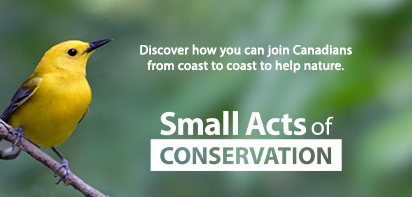Volunteers needed to remove the “Phrag-mentation” in Frontenac
Invasive species removal event taking place near Elbow Lake
This week, Frontenac-area volunteers are encouraged to lend nature a helping hand. The Nature Conservancy of Canada (NCC) invites the public to get involved in caring for nature by attending an upcoming Conservation Volunteers event to help control phragmites, Ontario’s worst invasive species.
Volunteers will join NCC staff to take part in the manual control and removal of phragmites, which will further prevent this invasive, non-native species from spreading. This will also allow native vegetation to flourish once again and provide critical habitat for many species of plants and animals.
Phragmites negatively impacts at least 25 per cent of species at risk in Ontario. By controlling it, we support these species by conserving their habitat.
This Conservation Volunteers event will be held along the Opinicon Road in the Loughborough Wilderness located in South Frontenac, near Elbow Lake, on Monday September 25, 2023, from 12 p.m. to 4 p.m. No prior experience is required, and training will be provided.
This habitat restoration effort showcases how NCC is accelerating the pace of conservation in Canada. In the past two years alone, NCC has influenced the protection of more than one million hectares (almost twice the size of Prince Edward Island), coast to coast to coast. Over the next few years, the organization will double its impact by mobilizing Canadians and delivering permanent, large-scale conservation, as well as working with people to improve habitats through Conservation Volunteers events.
In the face of rapid biodiversity loss and climate change, nature is our ally. There is no solution to either without nature conservation. When nature thrives, we all thrive.
Quotes
“At NCC, we believe that all people can play an important role in caring for nature. By working together to control invasive phragmites, we are contributing to healthier ecosystems here in the Frontenac Arch area and ensuring that the species that depend on them can flourish. It’s a great way to participate in conservation and leave a lasting impact for nature right in your community.” – Rob McRae, Program Director - Eastern Ontario, Nature Conservancy of Canada
Facts
- Phragmites (or common reed) is a non-native, invasive reed from Eurasia, and it is quickly spreading throughout North America. Found mostly in wetlands, this towering plant takes over moist areas, choking out all other life. It outcompetes native wetland plants, leaving frogs and turtles without vital habitat and blocking shoreline views and access.
- Although it grows mostly in wetlands, it can also be found growing in roadside ditches and on beaches and dunes.
- Once introduced into an area, the plant's roots spread far and wide below wetlands in a vast network of rhizomes. Its seeds are easily wind-dispersed, allowing phragmites to further invade other habitats.
- Invasive phragmites grows in stands that can be extremely dense, with as many as 200 stems per square metre — so dense that it crowds out other species — and can reach heights of up to six metres. Invasive phragmites grows so densely that it acts as a physical barrier to native plants and wildlife.
About
The Nature Conservancy of Canada (NCC) is the country’s unifying force for nature. NCC seeks solutions to the twin crises of rapid biodiversity loss and climate change through large-scale, permanent land conservation. As a trusted partner NCC works with people, communities, businesses and government to protect and care for our country’s most important natural areas. Since 1962, NCC has brought Canadians together to conserve and restore more than 15 million hectares. To learn more, visit natureconservancy.ca.
For photos, click here.
Learn More
Follow us on on X (formerly Twitter): x.com/NCC_CNC | x.com/NCC_CNCMedia
Find us on Facebook
- 30 -



